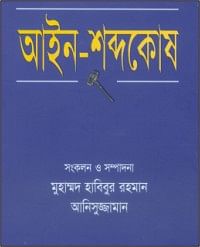Law Book Review
Book Review
Ain-Sabdakos
Compiled and edited by
Muhammad Habibur Rahman and
Anisuzzaman
Published by Mazharul Islam,
Anyaprokash, Dhaka
Syed Masud Reza
 The need for an exhaustive law lexicon has been felt for a long time. Within our domestic legal spheres in fact there was no intellectual endeavour to meet that need with the required magnitude and gravity. Very recently, a new lexicon has been added to the field of laws which substantially fills in that vacuum, thanks to the contribution made by one of the most renowned jurists, the former chief justice of Bangladesh, Justice Muhammad Habibur Rahman and a famous linguist and intellectual Dr. Anisuzzaman. The authors are the leading experts in their respective fields and certainly this unique combination reflected the best possible feat and realisation of the need. This publication was sponsored by CIDA Legal Reform Project Part-A.
The need for an exhaustive law lexicon has been felt for a long time. Within our domestic legal spheres in fact there was no intellectual endeavour to meet that need with the required magnitude and gravity. Very recently, a new lexicon has been added to the field of laws which substantially fills in that vacuum, thanks to the contribution made by one of the most renowned jurists, the former chief justice of Bangladesh, Justice Muhammad Habibur Rahman and a famous linguist and intellectual Dr. Anisuzzaman. The authors are the leading experts in their respective fields and certainly this unique combination reflected the best possible feat and realisation of the need. This publication was sponsored by CIDA Legal Reform Project Part-A.
“Ain Sabdakos” the title of the book reflects its nature quite fairly; its cover design is pertinent with its content. This is the largest informative lexicon of its kind, which covers almost 6000 terms currently being used in theoretical and practical juridical sciences. The terms are alphabetically ordered and in most cases are explicated with consistent citations from domestic and international law. Definitely, it will satisfy the academic and intellectual needs. Though the primary aim of the lexicon was to assist the legislative drafting, it would undoubtedly serve the need of larger legal community. Regarding the volume, motivation, design and depth of language this is definitely an outstanding work. Its getup is nice and pleasant.
The compilers showed their mastery in translating the terms; articulations followed the usual fashion of legal literature. The depth of language is excellent. Alongside, it can be mentioned that it would make reading easier and more comprehensible had the lexicon been prepared in standard language (Cholito Bhasha), instead of classical language (Sadhu Bhasha). This is notwithstanding the editors' assertion that they followed the language style of our constitution the version of which is in Bengali. In book size it's a medium one, but it could get a better look if it had been published in royal size.
Again, for law students and many others, the price of the book (white paper print 1500 taka, paperback edition 1000 taka) is high. A student edition of the same would be suggestible for undergraduate and post graduate levels. It would be better had the lexicon simultaneously included legal maxims and principles; thus it could have a wider appeal and an exhaustive makeup. We hope that this lexicon will comprehensibly meet the need of lawyers, law students, jurists, judges, law readers and so on.
The author is Lecturer of Law, Stamford University